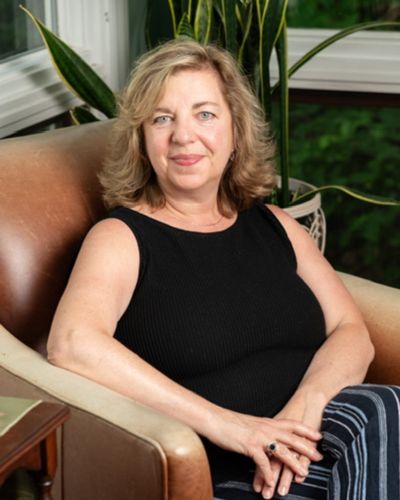Get to know new Chair and faculty member Jill Ehnenn
29 August 2024

Chair and Professor Jill Ehnenn
Jill Ehnenn recently joined the Department of English and Film Studies as a Professor and Chair of the department. We caught up with Professor Ehnenn and asked her about her work and interests.
What inspired you to enter this field?
Charlotte Bronte's 1847 novel Jane Eyre. I was ten and already a voracious reader when it first captivated me. I've probably re-read it almost every year since then and each time I'm struck by something new. It's about coming of age in a problematic and hypocritical world and invites us to think about gender and class and colonialism and living with integrity. It's emblematic of what I find so fascinating about 19th-century Britain and why Victorian texts are still so relevant to today's world. But most of all, Jane Eyre is just a really fantastic read! When I realized I could make a living doing something I already loved to do, well, that was all the inspiration I needed.
What can you tell us about your professional background and what have you enjoyed most about your career so far?
I actually began my education as a pre-med major! I earned an interdisciplinary Natural Sciences BA at The Johns Hopkins University and worked in a lab for a while. I didn't really enjoy the work, so since I was constantly reading literature anyway, I decided to try my hand at an MA in English at Northwestern University. There, thanks to some great professors, I had a real "a-ha moment" and decided I had found my calling. I then did a PhD in English at The George Washington University. Prior to coming to U of A I was Professor of English at Appalachian State University, where I taught Victorian Studies and queer theory. There I served as Assistant Chair in the English department, and in a variety of other administrative university roles. I'm really excited to be starting this new chapter as Chair of English and Film Studies here at U of A.
I enjoy so many things about my career. I look to the past to better understand and improve the present, and in so doing, I read fantastic novels and poetry, analyze texts and other cultural artifacts, and talk to really smart people all day long. It's the best thing ever!
What can you tell us about your research?
My scholarly interests focus upon intersections of subjectivity, sexuality, and embodiment in nineteenth-century literary and visual texts. Using feminist, queer, and disability studies alongside historical and formalist approaches, my work explores connections between textual representation and desire, normalcy, identity, and power. I’ve published on many writers; but my long-standing passion has been Katharine Bradley and Edith Cooper, two late-Victorian female aesthetes, dramatists, diarists, and self-proclaimed “poets and lovers” who wrote collaboratively under the name “Michael Field.” In my second book, Michael Field's Revisionary Poetics (Edinburgh UP, 2023), I demonstrate that for Michael Field, the revisionary poetics of rewriting old stories and traditional literary forms provided a fruitful strategy for the coauthors to represent their aesthetic impressions, gendered critiques of late-Victorian modernity, and dreams of future fame. Highly interdisciplinary, this book positions Michael Field as a major thinker and influence in the transition from Victorian to Modernist thought. I am now beginning two new projects: a co-authored biography of Michael Field; and a third monograph, which will provide intersectional models for understanding how ekphrasis (literary writing about art) contributed to 19th-century “world”-building.
What’s your personal teaching philosophy?
Rather than asking students to memorize facts, I believe in teaching students how to ask good questions and to be resourceful, interdisciplinary thinkers. I enjoy guiding students as they navigate challenging, complex ideas and explore the beauties and pleasures of texts--even very difficult ones. I especially love when students realize they have greatly exceeded what they previously thought they could do--and that they very much enjoyed doing so! For me, that's real success as a teacher. All these things are why English and Film Studies--really any Humanities study-- provides experiences that are crucial for thriving in today's complex world. In addition to gaining flexible job skills that will serve them over a lifetime, students in Humanities classes broaden their horizons, increase their respect for difference, build capacity for empathy, and acquire habits of mind that result in good lives-- fulfilling lives. It's important to me that my students recognize--and can articulate--these longer term implications of what they are learning in their EFS classes.
What are your interests/hobbies outside of work?
I like to hike and bike and garden and look forward to trying out snowshoeing and cross-country skiing. I enjoy cooking and baking and playing with my two cats Sam and Frodo. My partner and I have been known to throw murder-mystery parties (costumed of course). And although I wouldn't say I'm very good (yet), I love to play classical music on the piano and dabble in watercolor painting.